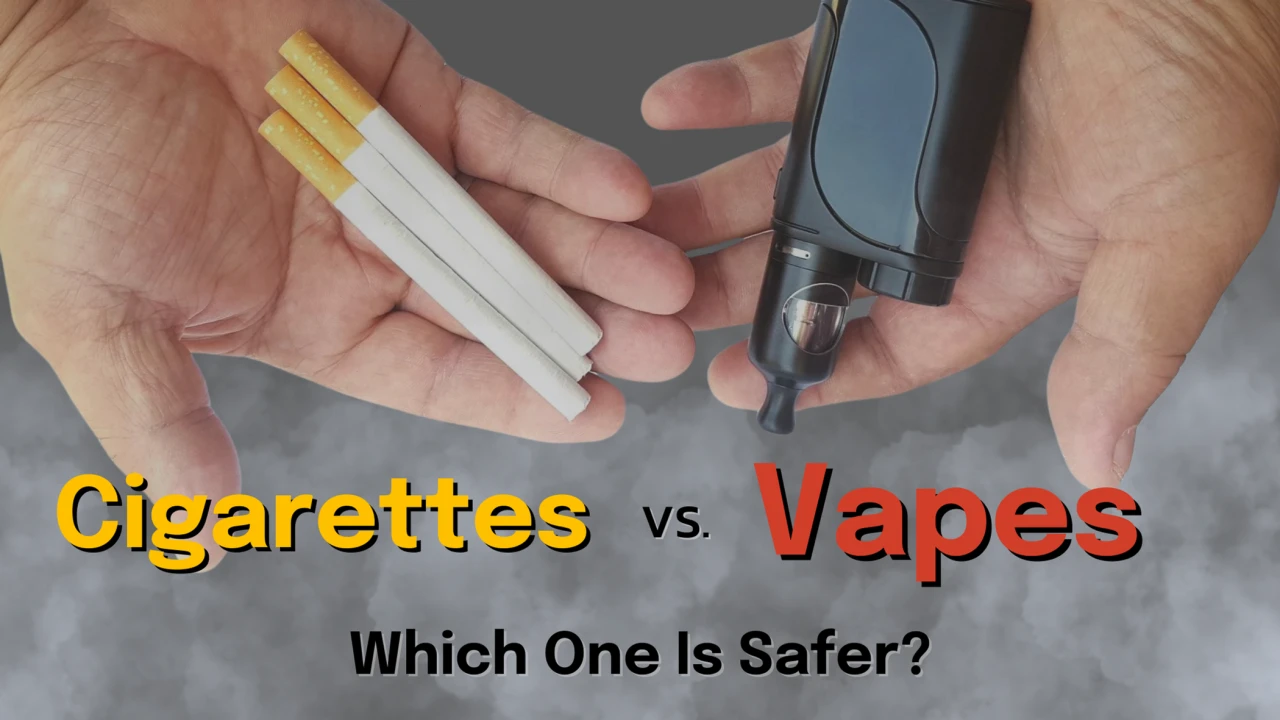Vaping in Kenya: A Safer Alternative to Smoking?
Is Vaping Healthier Than Smoking in Kenya? Here's What You Need to Know With rising concerns over the health risks of smoking, many Kenyans are turning to vaping as a potentially safer alternative. But is vaping truly a healthier option? In this in-depth guide, we break down the facts about vaping in Kenya, comparing it to traditional smoking. From understanding the technology behind e-cigarettes to exploring the health risks and benefits, this article provides everything you need to know. Discover how vaping could help smokers reduce harmful chemicals, how it’s regulated in Kenya, and whether it’s the right choice for you. Plus, we’ll share insights into the growing vape culture in Kenya and why more people are making the switch. Whether you're a smoker looking for an alternative or just curious about the latest trends, this article is your ultimate resource for vaping in Kenya. Stay informed, stay healthy—be part of the vaping revolution. Read on to find out if vaping is the game-changer you’ve been waiting for!

As smoking rates decline globally, many Kenyans are turning to vaping as a potentially healthier alternative. With increasing awareness about the dangers of tobacco use, vaping has emerged as a modern solution that promises fewer health risks. But how true are these claims? Is vaping really a safer choice for smokers in Kenya, or is it just another passing trend?
In this article, we dive deep into the world of vaping, providing essential insights tailored to the Kenyan context. From exploring the science behind e-cigarettes to understanding the health implications, we’ll break down everything you need to know about vaping in Kenya. Whether you’re a current smoker seeking a better alternative or simply curious about the growing vaping culture, this guide will equip you with the facts.
Join us as we explore why vaping is becoming a popular choice in Kenya and whether it’s truly the healthier option for those looking to quit smoking.
Is Vaping a Healthier Alternative to Smoking? A Comprehensive Guide for Kenyans

In recent years, the conversation around smoking alternatives has gained significant attention, especially in Kenya. As the harmful effects of traditional tobacco smoking become more widely known, many individuals are turning to vaping as a potential safer option. But is vaping truly a healthier alternative to smoking? This guide aims to explore the facts and myths surrounding vaping in Kenya, shedding light on its potential benefits and risks.
What Is Vaping and How Does It Work?
Before diving into the health implications, it’s important to understand what vaping is and how it works. Vaping involves inhaling vapor produced by an electronic cigarette or similar device. These devices, commonly known as e-cigarettes, heat a liquid (commonly referred to as e-liquid or vape juice) that typically contains nicotine, flavorings, and other chemicals. The heated liquid creates a vapor that is inhaled into the lungs, simulating the act of smoking.
Unlike traditional cigarettes, which burn tobacco to produce smoke, e-cigarettes do not produce tar or many of the toxic chemicals found in tobacco smoke. This difference is one of the key factors behind the belief that vaping is a safer alternative.
The Health Risks of Smoking: A Global Concern
Smoking remains one of the leading causes of preventable deaths worldwide, and Kenya is no exception. The World Health Organization (WHO) estimates that tobacco use is responsible for over 8 million deaths annually, with a significant portion of these deaths occurring in low- and middle-income countries like Kenya.
Cigarette smoke contains over 7,000 chemicals, many of which are harmful to the body. These include tar, carbon monoxide, and formaldehyde—substances known to cause lung cancer, heart disease, respiratory issues, and other serious health problems. Second-hand smoke also poses a significant risk to those around smokers, leading to increased rates of lung cancer and heart disease among non-smokers.
Given the well-documented health risks of smoking, many individuals are seeking alternatives that might offer a less harmful way to consume nicotine. This is where vaping comes in.
Vaping: A Safer Alternative to Smoking?
Vaping has become increasingly popular in Kenya as many smokers look for a healthier alternative. While it is still not without risks, vaping is generally considered to be less harmful than smoking. Here’s why:
- Fewer Toxic Chemicals: Traditional cigarettes release thousands of harmful chemicals when burned. E-cigarettes, on the other hand, produce vapor rather than smoke, significantly reducing the number of toxins inhaled. According to research from Public Health England, e-cigarettes are estimated to be around 95% less harmful than smoking traditional cigarettes.
- No Tar: One of the most dangerous components of cigarette smoke is tar. It coats the lungs and leads to severe respiratory diseases. Since e-cigarettes do not burn tobacco, they don’t produce tar, which significantly reduces the risk of lung diseases like emphysema and chronic bronchitis.
- Nicotine Control: Vaping offers smokers the ability to control their nicotine intake. E-liquids come in varying nicotine concentrations, allowing individuals to gradually reduce their nicotine dependency if desired. This gradual reduction can be an effective smoking cessation strategy.
The Potential Health Risks of Vaping
While vaping is considered safer than smoking, it is not without risks. There are still many unknowns when it comes to the long-term effects of vaping. Some of the potential risks include:
- Nicotine Addiction: Like smoking, most e-cigarettes contain nicotine, which is highly addictive. Nicotine addiction can lead to various health issues, including increased heart rate, high blood pressure, and a greater risk of heart disease. For those who are not already nicotine users, there is also the risk of becoming addicted.
- Respiratory Issues: While vaping doesn’t produce tar, the inhalation of e-cigarette vapor can still cause respiratory issues, especially for individuals with pre-existing lung conditions. Some studies have found that the chemicals used in e-liquids can irritate the airways, leading to inflammation and discomfort.
- Unknown Long-Term Effects: Since vaping is a relatively new phenomenon, the long-term effects are not fully understood. Research is ongoing, and it may take years to determine the full extent of any health risks associated with prolonged use.
Vaping in Kenya: The Growing Popularity
Vaping has gained significant traction in Kenya over the past few years, particularly among younger individuals and those trying to quit smoking. As more people seek alternatives to traditional cigarettes, the demand for e-cigarettes and vape products has surged. However, the popularity of vaping has also raised questions about regulation and safety.
In Kenya, the legal status of vaping remains somewhat ambiguous. The Tobacco Control Act of 2007 regulates the sale and advertising of tobacco products, but there is limited regulation specifically for e-cigarettes. As a result, the market for vaping products is largely unregulated, which can lead to concerns about product quality and safety.
Vaping and Smoking Cessation in Kenya
For many smokers in Kenya, vaping has become a tool for smoking cessation. While quitting smoking can be incredibly challenging, vaping offers a less harmful way to consume nicotine without the harmful effects of traditional cigarettes. Some individuals use vaping as a stepping stone to eventually quit nicotine altogether.
Studies have shown that smoking cessation methods, such as nicotine replacement therapy (NRT), can be effective in helping individuals quit smoking. Vaping has been suggested as a potential NRT, allowing smokers to gradually reduce their nicotine intake while still satisfying their cravings. This method can be particularly beneficial for smokers who have struggled to quit using traditional methods like patches, gum, or medication.
The Legal Landscape of Vaping in Kenya
As vaping becomes more popular in Kenya, questions around regulation and safety have emerged. Currently, there are no specific laws in Kenya that govern the sale, marketing, or use of e-cigarettes. However, the general sale of tobacco products is tightly regulated under the Tobacco Control Act.
In 2019, the Kenyan government proposed a ban on the importation and sale of e-cigarettes. The proposed ban was based on concerns about the safety of vaping products and the potential for them to act as a gateway to smoking, particularly among youth. However, the ban has not been fully implemented, and vaping remains legal in Kenya—though the lack of regulation raises concerns about the quality and safety of the products available in the market.
Should You Switch to Vaping? Key Considerations
If you’re a smoker in Kenya considering making the switch to vaping, it’s important to weigh the pros and cons. While vaping may offer a less harmful alternative to smoking, it is not risk-free. If you are looking to quit smoking, there are several strategies you can explore, including:
- Gradual Reduction: Switching to vaping with lower nicotine concentrations can help you reduce your nicotine dependency over time.
- Smoking Cessation Programs: Many organizations in Kenya offer smoking cessation programs that provide support, resources, and guidance to help you quit.
- Consult a Health Professional: Before making the switch, it’s a good idea to consult with a healthcare professional who can guide you based on your individual health needs.